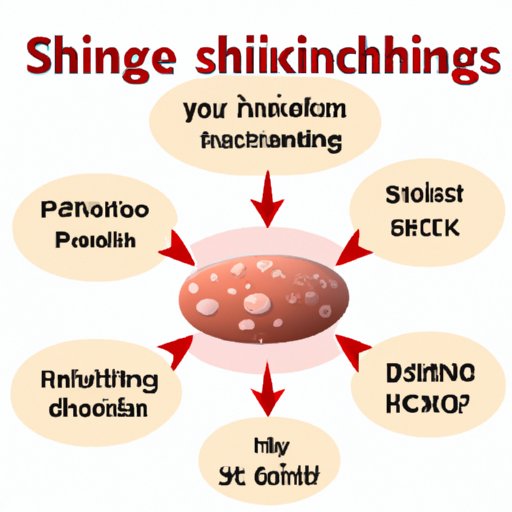
I. Introduction
Chickenpox and shingles are two viral infections that are caused by the same virus. Chickenpox, also known as varicella, is a common illness that affects many people, especially children. Shingles, on the other hand, is a more severe condition that affects people who have already had chickenpox. In this article, we will explore the link between chickenpox and shingles, and discuss whether you can get shingles from chickenpox.

II. The Link Between Chickenpox and Shingles: What You Need to Know
The Varicella zoster virus (VZV) is the virus that causes both chickenpox and shingles. Once someone has had chickenpox, the virus remains dormant in their spinal cord. As they age, or if their immune system is weakened, the virus can reactivate and cause shingles. This means that if you have had chickenpox before, you are at risk of developing shingles later in life.
Shingles is not as common as chickenpox, but it still affects many people. According to the Centers for Disease Control and Prevention (CDC), about 1 in 3 people in the United States will get shingles in their lifetime. This is because about 99% of adults in the US have had chickenpox, which puts them at risk of developing shingles.
III. Shingles and Chickenpox: Understanding the Connection
The symptoms of chickenpox and shingles are similar, but there are some differences. Chickenpox usually starts with a fever, followed by a rash that spreads all over the body. The rash typically appears as small, itchy, fluid-filled blisters. Shingles, on the other hand, usually starts with a burning or tingling sensation in one area of the body, followed by a rash that appears as a cluster of painful blisters.
Both chickenpox and shingles are highly contagious and can be spread through contact with fluid from the blisters. The virus can also be spread through coughing or sneezing. It is important to note that you cannot get shingles from someone who has shingles. However, if you have not had chickenpox before and you come into contact with someone who has shingles, you can develop chickenpox.
IV. Can You Get Shingles from Chickenpox? Debunking the Myths
There are some common myths about the connection between chickenpox and shingles. One of the biggest myths is that you can only get shingles if you had severe chickenpox. However, this is not true. Even if you had a mild case of chickenpox, you can still get shingles later in life.
Another myth is that everyone who had chickenpox will eventually get shingles. While it is true that anyone who had chickenpox is at risk of developing shingles, not everyone who had chickenpox will actually get shingles. The risk factors that increase the likelihood of developing shingles will be discussed later on in this article.
V. The Real Risk of Developing Shingles After Chickenpox
Once a person has had chickenpox, the virus remains dormant in their spinal cord. There are many factors that can cause the VZV to reactivate and cause shingles. These factors include aging, stress, illness, and certain medications. The risk of developing shingles increases as you age, with people over the age of 50 being the most at risk.
Medical conditions that weaken the immune system can also increase the risk of developing shingles. These conditions include HIV/AIDS, cancer, and organ transplant recipients who are taking immunosuppressive medications. People who smoke or have a history of heavy alcohol use may also be at an increased risk of developing shingles.
VI. Exploring the Relationship Between Chickenpox and Shingles
Having chickenpox can have long-term effects on your health, such as an increased risk of developing shingles later in life. However, getting the chickenpox vaccine can reduce your risk of developing shingles. The chickenpox vaccine is recommended for all children and adults who have not had chickenpox.
There is some evidence to suggest that getting the chickenpox vaccine may increase the risk of developing shingles later in life. However, the risk is still very low. In addition, the vaccine has been shown to reduce the severity of shingles and lower the risk of complications, such as postherpetic neuralgia (PHN) and vision loss.
VII. From Chickenpox to Shingles: How the Virus Reactivates
The VZV can remain dormant in the spinal cord for many years. When the virus reactivates, it travels along the nerves and causes inflammation, which results in the painful rash and blisters of shingles. The triggers that cause the virus to reactivate are not fully understood, but aging and a weakened immune system are believed to be major factors.
Other factors that can trigger VZV reactivation include stress, illness, injury, and exposure to radiation. In some cases, there may be no known trigger for the reactivation of the virus. It is important to note that shingles is not contagious, but the virus can be spread through contact with fluid from the blisters.
VIII. Preventing Shingles: Understanding How Chickenpox Plays a Role
The best way to prevent shingles is to get the chickenpox vaccine. This vaccine can reduce your risk of developing chickenpox, which in turn can reduce your risk of developing shingles later in life. The vaccine is recommended for all children and adults who have not had chickenpox.
Other preventative measures that can reduce the risk of developing shingles include maintaining a healthy immune system, managing stress, and avoiding exposure to people who have shingles. If you do develop shingles, it is important to seek medical attention right away to reduce the risk of complications.
IX. Conclusion
In conclusion, chickenpox and shingles are two viral infections that are caused by the same virus. If you have had chickenpox before, you are at risk of developing shingles later in life. The risk of developing shingles is increased by factors such as aging, stress, illness, and certain medical conditions.
The best way to prevent shingles is to get the chickenpox vaccine. This vaccine can reduce your risk of developing chickenpox, which in turn can reduce your risk of developing shingles later in life. It is also important to maintain a healthy immune system and avoid exposure to people who have shingles. By taking these preventative measures, you can reduce your risk of developing shingles and stay healthy.




